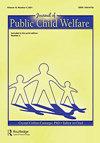Fostering a sense of belonging: The role of family terminology and discourse for individuals involved in non-kinship foster care
IF 1.2
4区 社会学
Q3 SOCIAL WORK
引用次数: 1
Abstract
ABSTRACTThis study examines how fostered individuals, foster carers, bio-legal children of foster carers and birth parents use discourse to construct and maintain family identity and what may influence this use. Focus group and interview data show how family terminology may create a sense of family, affirm and strengthen ties, erase distinctions, promote inclusion and conformity and protect, refute and explain ties to in- and outsiders. Family terminology use is dynamic and can be influenced by (conflicting) beliefs about who is entitled to these terms and the difficulty of sharing terms. Stakeholders showed many commonalities. Practice and research implications are discussed.KEYWORDS: family terminologydiscourse dependencyfamily identityfoster careout of home care AcknowledgmentsThe authors would like to thank the directors and employees of all Flemish foster care agencies for their assistance in disseminating our call and recruiting participants. Special thanks to foster care workers Let Moustie, Anja Dekeyser, Anja Janssens and Ann Van de Vel of Pleegzorg Provincie Antwerpen and Pleegzorg Limburg for their support and insights throughout the project and to all participants for sharing their experiences.Disclosure statementNo potential conflict of interest was reported by the authors.Data availability statementThe participants of this study did not give written consent for their data to be shared publicly, so due to the sensitive nature of the research supporting data is not available.Notes1. The term bio-legal children of foster carers refers to both the biological and legal (e.g., adoptive) children of foster carers.2. The term non-kinship foster care refers to the formal placement of children with unrelated and previously unknown foster carers. For the remainder of this article, we will abbreviate it as “foster care.”3. CFC refers to both current and former children in foster care.4. This is written out heteronormatively, foster carers in same-sex relationships used conjugations of these words.Additional informationFundingThis study received no specific grant from any funding agency in the public, commercial, or not-for-profit sectors.Notes on contributorsLara WullemanLara Wulleman is a PhD researcher at the University of Leuven, Faculty of Psychology and Educational Sciences. She has a background in Applied Psychology and Gender and Diversity studies. Her research focuses on the concept of family and belonging in foster care.Hans GrietensHans Grietens is a Professor at the University of Leuven, Faculty of Psychology and Educational Sciences. His research focuses on child welfare, child abuse and neglect, trauma in children and the experiences of children and youth in care.Ilse NoensIlse Noens is a Professor at the University of Leuven, Faculty of Psychology and Educational Sciences and coordinator of Leuven Autism Research (LAuRes). Her research focuses on neurodiversity, ethics of early detection and intervention for autism and participatory research.Nicole VliegenNicole Vliegen is a Professor at the University of Leuven, Faculty of Psychology and Educational Sciences and director of the Psychodynamic Child Psychotherapy Training of the KU Leuven. Her research focuses on adoption, early complex trauma, parenting and depression.培养归属感:家庭术语和话语对参与非亲属寄养的个体的作用
摘要本研究探讨被寄养个体、寄养照料者、寄养照料者的亲生子女和亲生父母如何使用话语来构建和维持家庭身份,以及可能影响这种使用的因素。焦点小组和访谈数据显示,家庭用语如何创造一种家庭感,肯定和加强关系,消除差异,促进包容和一致性,保护、反驳和解释与内外的关系。家庭术语的使用是动态的,可能受到关于谁有权使用这些术语和共享术语的困难的(相互冲突的)信念的影响。利益相关者表现出许多共性。讨论了实践和研究意义。关键词:家庭术语话语依赖家庭身份寄养家庭护理致谢作者感谢所有佛兰德寄养机构的主管和员工在传播我们的呼吁和招募参与者方面的帮助。特别感谢来自安特卫普省和林堡省的寄养工作者Let Moustie、Anja Dekeyser、Anja Janssens和Ann Van de Vel在整个项目过程中的支持和见解,感谢所有参与者分享他们的经验。披露声明作者未报告潜在的利益冲突。数据可用性声明本研究的参与者未书面同意其数据被公开共享,因此由于研究的敏感性,支持数据不可用。养育者的亲生子女一词是指养育者的亲生子女和法定子女(如收养子女)。非亲属寄养一词是指将儿童正式安置给不相关的和以前不认识的寄养照料者。在本文的剩余部分,我们将把它缩写为“寄养”。CFC指的是现在和以前被寄养的儿童。这是异性恋规范的书写,同性关系中的寄养者使用这些词的变化。本研究未获得任何公共、商业或非营利部门的资助机构的特别资助。作者简介lara Wulleman是鲁汶大学心理与教育科学学院的博士研究员。她拥有应用心理学和性别与多样性研究的背景。她的研究重点是寄养家庭的概念和归属感。Hans Grietens是鲁汶大学心理与教育科学学院的教授。他的研究重点是儿童福利、儿童虐待和忽视、儿童创伤以及儿童和青少年的护理经历。Ilse Noens是鲁汶大学心理学和教育科学学院的教授,也是鲁汶自闭症研究(LAuRes)的协调员。她的研究主要集中在神经多样性、自闭症早期检测和干预的伦理以及参与性研究。Nicole Vliegen是鲁汶大学心理学和教育科学系的教授,也是鲁汶大学心理动力学儿童心理治疗培训的主任。她的研究重点是收养、早期复杂创伤、育儿和抑郁症。
本文章由计算机程序翻译,如有差异,请以英文原文为准。
求助全文
约1分钟内获得全文
求助全文
来源期刊

Journal of Public Child Welfare
SOCIAL WORK-
CiteScore
3.10
自引率
12.50%
发文量
38
期刊介绍:
Decisions made in the practice of child welfare have lifelong effects on children and their entire families which in turn affects every facet of society. To effectively practice in this vital field, social workers, psychologists, counselors, juvenile court judges, attorneys, and other child welfare professionals need to stay informed about the latest findings and important issues in public child welfare. To answer this crucial need, the Journal of Public Child Welfare provides a broad forum for theory-based and applied research in child welfare. Rather than limit itself to primarily private agencies, this essential journal provides the quality research and comprehensive information that child welfare professionals and public agencies need most.
 求助内容:
求助内容: 应助结果提醒方式:
应助结果提醒方式:


